Political Activist Denounces Raisi's Regime As He Addresses UN
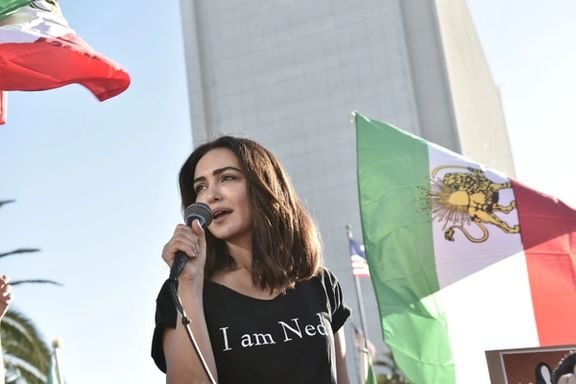
Iranian-born actress and political activist Nazanin Boniadi has spoken out against President Ebrahim Raisi as he continues his propaganda mission at the United Nations.

Iranian-born actress and political activist Nazanin Boniadi has spoken out against President Ebrahim Raisi as he continues his propaganda mission at the United Nations.
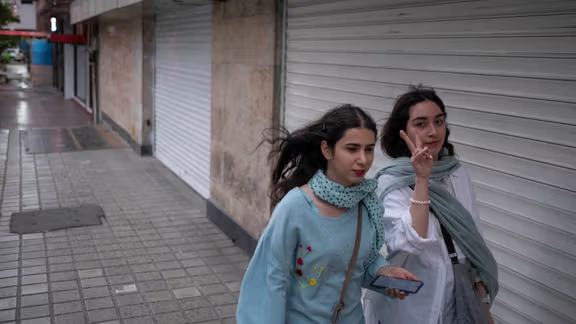
The protest movement in Iran in the past year did not topple the regime but succeeded in making a serious dent into one of its important tenets, the compulsory hijab.
“I will not put up a profile picture with mandatory hijab just to be allowed to join our WhatsApp work group,” this was the message Sara, an aspiring Iranian engineer working in Tehran, recently conveyed to her manager, disregarding the potential risk of dismissal.
Concerned for her safety and security, she asked her real name and the title of the Iranian startup company that employs her not to be disclosed. “I much rather have no profile picture than one with hijab,” read the next line of Sara’s message.
She was, moreover, sternly admonished to play by the book and refrain from posting any photos without hijab on her X account or to face possible dismissal from work.
"We Iranian women are not reverting to our pre-Mahsa era," she firmly asserted, alluding to Mahsa Amini, the 22-year-old Iranian woman whose tragic death on September 16, 2022, resulted from injuries sustained in police custody of Tehran’s hijab police. Her passing ignited a fresh wave of anti-regime protests throughout Iran and gave rise to the globally recognized "Woman, Life, Freedom" movement advocating for democracy in the Middle East.
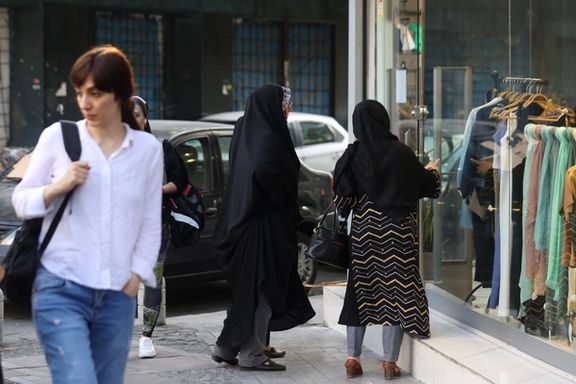
The prosperous company where Sara is employed holds significant concerns regarding potential actions by regime authorities. Informed sources have revealed to Iran International that these authorities might conduct office inspections throughout Iran to ensure strict adherence to the mandatory hijab law among both management of private firms and their female employees.
Flabbergasted by the staunch defiance of women against the compulsory hijab law and on the first anniversary of Mahsa Amini’s death, the Iranian regime has been playing all its cards to deter women from taking off their hijab in public, but with very little success.
The streets were the scene of the most bizarre incident following Mahsa’s death: setting fire to headscarves as the symbol of more than four decades of enslaving women and holding hostage their most basic freedoms as to how to cover themselves and have control over their bodies.
This becomes particularly significant when considering that Iran is a Shia Muslim country where, following the 1979 “Islamic Revolution”, the clerical establishment mandated hijab and outlined the highest aspirations for an Iranian woman as being a “devout and revolutionary” mother and a “faithful and obedient” wife.
This time however, after decades of various campaigns, resistance, and enduring the harshest forms of suppression and imprisonment, women have courageously emerged in public spaces without headscarves. They are boldly proclaiming “Woman, Life, Freedom” a modern and forward-thinking slogan that has profoundly shaken the entire nation and indeed the world, drawing an overwhelming wave of empathy and support for the women's movement in Iran.
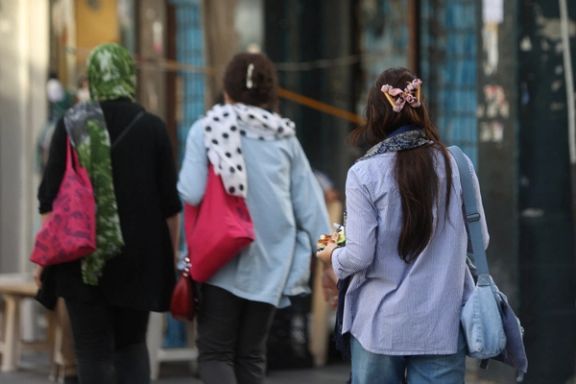
“I think Iranian women showed an unprecedented level of courage from the onset of the Women, Life, Freedom movement. They burned their headscarves, defying baton and bullets and said no to hijab despite being fearful of possible acid attacks, arrest, and sexual assault (by the regime agents),” said Sogand, a prominent Iranian women's rights activist, who asked not to be identified by her real name out of fear of retribution from the regime.
Elaborating more on her perspective regarding the direction that the Iranian women’s movement has taken after the death of Mahsa, she maintained that the bravery for removing and burning headscarves in public is not something that could either vanish or be stripped away from women easily. It is this enduring valor on the part of Iranian women that has instilled fear in the regime to the point that it constantly issues new orders and directives aimed at further tightening the enforcement of the compulsory hijab.
The top brass of Iran’s establishment has advocated for viciously severe punishment for women who opt to remove their hijab, including actions such as flagging, imposing heavy prison sentences as well as substantial financial penalties, and even depriving them from receiving medical care, banking services, or the opportunity to take part in the university entrance exam known as Concours.
Despite the ongoing intimidation campaign orchestrated by the clerical regime, many women's rights activists, including Sogand, firmly believe that it will ultimately fail to force women to retreat.
She emphasized that any additional acts of violence against women in connection with the mandatory hijab could further inflame public anger and potentially lead to a response similar to the widespread protests that erupted across Iran following Mahsa's tragic death.
The same belief is echoed by Zahra, a Tehran-based journalist who is identified by a pseudonym for protecting her safety. Recalling harrowing moments of terror after encountering a group of hardline plainclothes regime agents in southwest Tehran. They aggressively yelled at her and even threatened her physically for not covering her hair, and she clarified that other disobedient women likely share the same sense of terror and fear.
However, the unspoken and invisible bond they feel when passing by another unveiled woman with a smile on her face and a meaningful eye contact in silence is what motivates them to persist. The courage to resist the fear and intimidation that the regime seeks to instill in women's hearts is what truly makes them the everyday heroines they are, according to Zahra's perspective.
Two Iranian lawyers talking to Iran International on condition of anonymity, highlighted the case of one of their clients in Tehran who, as a government employee, refused to comply with the mandatory hijab law. Even after being charged and suspended from work several months ago, she stood her ground, asserting that she would not appear in court wearing hijab.
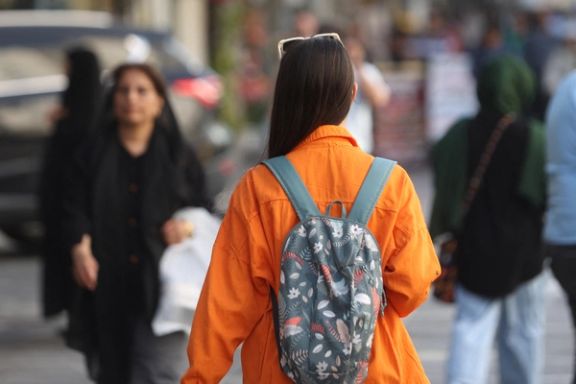
Discussing another female client whose small restaurant has been sealed twice in the past year due to her refusal to adhere to the hijab law, one of the attorneys remarked: “As a single mother, my client is currently facing significant financial hardship. However, whenever she visits my office, she arrives without a veil and firmly declares that she will not back down.”
In the year following Mahsa’s tragic death, Iranian society has also witnessed huge cracks in the thick and tall walls of the patriarchal system, which is deeply ingrained in the minds and collective consciousness of Iranians. This system has received persistent and substantial backing from the misogynistic and sexist regime. However, Iranian men have begun to publicly voice support for women’s human rights and freedoms by joining hands with them in rejecting mandatory hijab, which has turned women’s free will into a battlefield for the Iranian regime as it attempts to export its hardline ideologies.
Numerous women’s activists including Mahya Ostovar, an Iranian lecturer at the University of Galway in Ireland, firmly believe that the Woman, Life, Freedom movement has succeeded in bringing about a revolution, most of all in the minds and viewpoints of the rest of the society. It has motivated many to stand for women's cause and to advocate for a democratic Iran, free from the grip of a brutal clerical regime.
One year into the birth of this new movement, Iranian women have displayed remarkable resilience and determination. Collectively, they have boldly confronted the Iranian regime, showing no signs of backing down.
Considering this unwavering determination, Ostovar conveyed her belief that the Woman, Life, Freedom movement signifies the culmination of decades of women's activism and their fight for their rights. Consequently, it is not anticipated to regress, but rather continue and ultimately contribute to the downfall of the Iranian regime.
(This is an article by Maryam Moqaddam and Masoud Kazemi, journalists at Iran International)
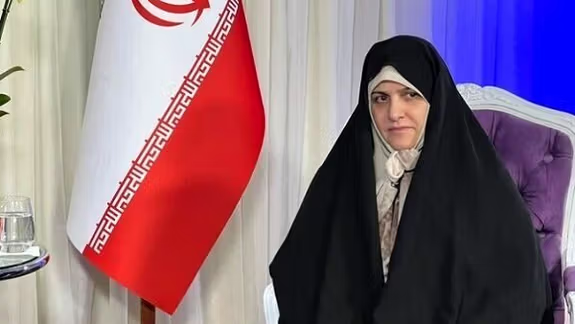
Despite months of women-led protests in Iran fighting systematic oppression, President Ebrahim Raisi’s wife claims women in Iran are content and do not seek equal rights.
In her first ever interview with a US media outlet, Jamileh Alamolhoda spoke to Newsweek, totally disregarding the last year of violent women-led uprising, dubbed Woman, Life, Freedom, which followed the death in morality police custody of 22-year-old Mahsa Amini.
As if there were no such uprising, she told Newsweek: "Women in Iran have not fought for their rights because they already enjoy their rights and that is due to the preservation of their dignity in society by men.
"The feminist movement from other parts of the world has also not found its way in Iran, and that is primarily due to the fact that it is inclined toward violence. As opposed to that, women in Iran prefer tranquility rather than being exposed to violence through the feminist approach."
The bizarre interview from Alamolhoda, the daughter of the hardline ultra conservative Friday Imam of the religious city of Mashhad, Ahmad Alamolhoda, comes amid a propaganda campaign being waged by the couple, which has also seen Raisi claim that women enjoy "unparalleled" rights in Iran, and denying the regime's race to nuclear armament.
It also came while new legislation to oppress hijab rebels was passed in parliament. The 'hijab and chastity' law was approved Wednesday, and will see even stricter crackdowns than are in place already. Over the last year, women refusing to wear the mandatory hijab have faced bans from public places, education, shops and malls, and have had severe punishments including fines and imprisonment.
The US-based Human Rights Activists News Agency (HRANA) has described the situation of women in Iran as “dire”. Since last year's unrest, at least 2,003 women were reprimanded in different ways, according to the rights group, including being summoned to police, for flouting the hijab.
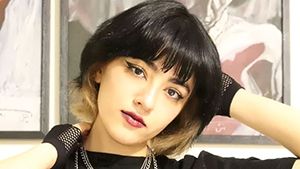
The family of Nika Shakarami, a 16-year-old abducted and murdered by security forces last year, continues to face state intimidation one year after her tragic death.
On Wednesday, her sister, Aida, disclosed that the security situation around her sister's grave has deteriorated over the past week, reporting having been victim of threats from unidentified individuals warning that if they visit Nika's grave, her mother Nasrin could face arrest.
Additionally, she revealed the Ministry of Intelligence has reluctantly permitted Nika's anniversary ceremony to proceed on Friday, contingent on the absence of violence.
Nika's final communication with a friend last September revealed that security forces were pursuing her on Keshavarz Boulevard in Tehran, after which she mysteriously disappeared. Her body, allegedly subjected to torture, abuse, and beatings by security forces, was identified by her family ten days later.
Later, the government agents seized Nika's body from Khorramabad and buried her secretly in a village in Lorestan, located in western Iran.
Over 500 civilians died in the wake of the uprising which followed the death in morality police custody of Mahsa Amini, including children and teens such as Nika.
Nika's family is not alone in suffering state intimidation. Just last week, Mahsa Amini's family were warned not to commemorate the anniversary of her death on September 16, closing access to the graveyard and arresting her father multiple times, including on the anniversary itself.
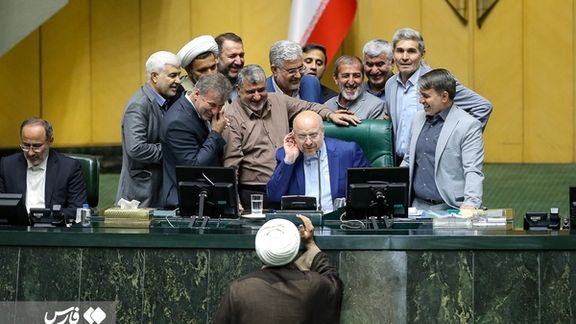
The Iranian parliament has approved a controversial hijab bill aimed at tightening pressure on women who defy the mandatory dress code in public.
On Wednesday, Parliament Speaker Mohammad-Bagher Ghalibaf announced that the bill was approved for a "three-year trial run" following coordination and a written confirmation by the judiciary.
The contentious bill's content was finalized by a committee of approximately 10 lawmakers making the best use of an obscure regulation known as Article 85. The only aspect voted upon was the duration for the trial implementation. During the Wednesday session, 152 MPs voted in favor, 34 voted against, and seven abstained.
Article 85 of the constitution enabled the parliament to effectively sideline opposition by restricting discussions on the bill to an internal committee. Under normal circumstances, the parliament cannot delegate its legislative authority. However, in necessary cases -- through Article 85 -- it can assign an internal committee to draft specific laws. The committee's decisions are then sent to the Guardian Council, whose members are chosen by Supreme Leader Ali Khamenei. If the council deems the decisions to be in line with the Constitution, they can be implemented in the country for a specified period as determined by the parliament.
Initially comprising only 15 articles, the "Hijab and Chastity" bill was sent to the Islamic Consultative Assembly by the administration of Ebrahim Raisi. It has since expanded to include 70 articles. The bill was proposed after months of nationwide protests following the death of Mahsa Amini, a 22-year-old woman who died in police custody last year, allegedly for breaching hijab rules.
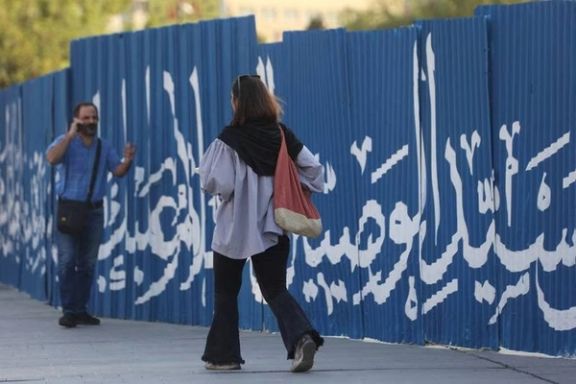
The bill outlines a wide range of punishments and penalties for individuals who defy hijab laws or even criticize compulsory hijab rules, whether online or offline. Even mocking the hijab on social media or elsewhere is subject to specific fines, and offenders may face a ban on leaving the country for up to two years. Additionally, various organizations, including the state broadcaster, are mandated to regularly report on their "duties" related to hijab enforcement to the parliament, interior ministry, or the Supreme Council of the Cultural Revolution.
The approval of the legislation comes amid mounting concerns raised by human rights experts and organizations who argue that the Islamic Republic is employing the bill as a tool for systematic discrimination against women and girls, with the aim of coercing them into unwavering compliance with the government's dictates.
Legal experts say the hijab bill violates not only civil rights but also the Constitution and requires vast resources beyond the government’s means.
Human rights advocates have warned that the bill's implementation could lead to “increased violence, harassment, and arbitrary detentions of women and girls in Iran.” Both the United Nations Human Rights Commission and the UN's Independent International Fact-Finding Mission on the Islamic Republic of Iran have issued statements this month expressing their concerns over the potential consequences of this bill on the rights and freedoms of Iranian women.
“The legislation proposes increased fines and prison terms for women and girls found in breach of mandatory veiling provisions. It also proposes harsher punishments including travel bans, vehicle confiscations, the denial of education and public services, including medical facilities, and sanctions against businesses,” read the statement by the fact-finding mission.
The uprising sparked by the death in police custody of Mahsa Amini in September 2022 has made it increasingly difficult for the clerical regime to enforce the mandatory Islamic dress code. Since the beginning of the ‘Women, Life, Freedom’ movement, tens of thousands of girls and women have shed their compulsory hijab. The regime seeks to criminalize hijab defiance, but no branch of government wants to solely shoulder the responsibility for complications of such a provocative and risky action in society.
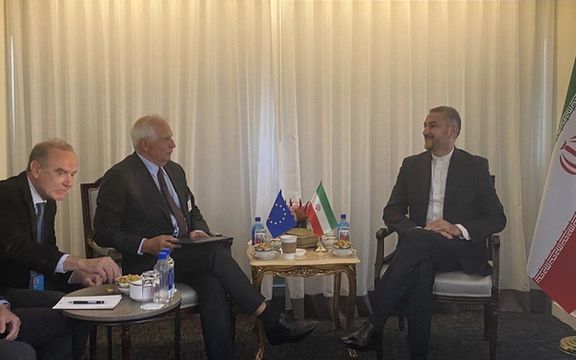
The EU's top diplomat strongly condemns the arbitrary detention of numerous EU citizens, including those with dual nationality, in Iran.
During a meeting held on Tuesday on the sidelines of the UN General Assembly in New York with Iranian Foreign Minister Hossein Amir-Abdollahian, Josep Borrell, the EU's Foreign Policy Chief, raised critical concerns regarding EU-Iran bilateral relations and the latest developments concerning the JCPOA nuclear agreement.
Borrell reiterated his call for the immediate release of all EU citizens in Iranian custody. In a statement released on the EU's official website, the bloc emphasized that its stance remains unchanged regarding the deeply troubling human rights situation within Iran.
"Iran must ensure the preservation of fundamental freedoms, as articulated by all 27 EU Member States on the anniversary of Mahsa Amini's tragic death."
Regarding the JCPOA, Borrell stressed the importance of pursuing a path of de-escalation. He urged Iran to reconsider its decision to revoke the official status of around one third of the International Atomic Energy Agency (IAEA) inspectors in Iran and to enhance its cooperation with the watchdog.
On Saturday, Iran withdrew the designation of several inspectors tasked with verifying activities in Iran under the Non-Proliferation Treaty Safeguards Agreement. Rafael Grossi, the Director General of the IAEA, stated, “This profoundly regrettable decision by Iran is another step in the wrong direction and constitutes an unnecessary blow to an already strained relationship between the IAEA and Iran in the implementation of the NPT Safeguards Agreement."
Borrell also expressed his strong belief in the necessity of seeking a diplomatic resolution to the Iran nuclear issue within the framework of the JCPOA and once again urged the Iranian government to cease its ongoing military cooperation with Russia in the unlawful war of aggression against Ukraine.
She addressed the brutal suppression of protesters in the last year of unrest in the wake of the death in morality police custody of Mahsa Amini which has led to the deaths of hundreds in the hands of security forces. "You speak of human dignity, but you starve your own people… You speak of peace, but your security forces unleash brutality on citizens when they rise unarmed to demand justice."
Boniadi drew attention to the regional chaos the regime's militias are causing, in the Middle East and beyond: "You proudly proclaim your anti-imperialist views and condemn proxy wars and boots on the ground, while the Islamic Republic trains, finances, and arms militias throughout the Middle East, as well as supports Russia’s war against Ukraine."
Her rousing speech touched on the "mass graves" of protesters sent to the gallows, families unable to bury their loved ones, bulldozed by the regime to "pretend they never existed".
In contrast, during his address to the UN General Assembly, President Ebrahim Raisi shifted blame onto foreign nations, accusing them of conducting a propaganda campaign against the Islamic Republic. He made only indirect references to the 2022 anti-regime protests, describing them as the most extensive media onslaught in Western history.






